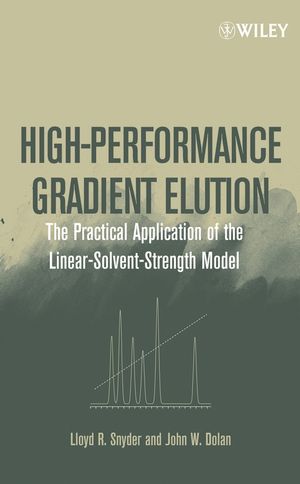High-Performance Gradient Elution: The Practical Application of the Linear-Solvent-Strength ModelISBN: 978-0-471-70646-5
Hardcover
496 pages
December 2006
 This is a Print-on-Demand title. It will be printed specifically to fill your order. Please allow an additional 10-15 days delivery time. The book is not returnable.
|
||||||
Gradient elution demystified
Of the various ways in which chromatography is applied today, few have been as misunderstood as the technique of gradient elution, which presents many challenges compared to isocratic separation. When properly explained, however, gradient elution can be less difficult to understand and much easier to use than often assumed.
Written by two well-known authorities in liquid chromatography, High-Performance Gradient Elution: The Practical Application of the Linear-Solvent-Strength Model takes the mystery out of the practice of gradient elution and helps remove barriers to the practical application of this important separation technique. The book presents a systematic approach to the current understanding of gradient elution, describing theory, methodology, and applications across many of the fields that use liquid chromatography as a primary analytical tool.
This up-to-date, practical, and comprehensive treatment of gradient elution:
* Provides specific, step-by-step recommendations for developing a gradient separation for any sample
* Describes the best approach for troubleshooting problems with gradient methods
* Guides the reader on the equipment used for gradient elution
* Lists which conditions should be varied first during method development, and explains how to interpret scouting gradients
* Explains how to avoid problems in transferring gradient methods
With a focus on the use of linear solvent strength (LSS) theory for predicting gradient LC behavior and separations by reversed-phase HPLC, High-Performance Gradient Elution gives every chromatographer access to this useful tool.
Of the various ways in which chromatography is applied today, few have been as misunderstood as the technique of gradient elution, which presents many challenges compared to isocratic separation. When properly explained, however, gradient elution can be less difficult to understand and much easier to use than often assumed.
Written by two well-known authorities in liquid chromatography, High-Performance Gradient Elution: The Practical Application of the Linear-Solvent-Strength Model takes the mystery out of the practice of gradient elution and helps remove barriers to the practical application of this important separation technique. The book presents a systematic approach to the current understanding of gradient elution, describing theory, methodology, and applications across many of the fields that use liquid chromatography as a primary analytical tool.
This up-to-date, practical, and comprehensive treatment of gradient elution:
* Provides specific, step-by-step recommendations for developing a gradient separation for any sample
* Describes the best approach for troubleshooting problems with gradient methods
* Guides the reader on the equipment used for gradient elution
* Lists which conditions should be varied first during method development, and explains how to interpret scouting gradients
* Explains how to avoid problems in transferring gradient methods
With a focus on the use of linear solvent strength (LSS) theory for predicting gradient LC behavior and separations by reversed-phase HPLC, High-Performance Gradient Elution gives every chromatographer access to this useful tool.



